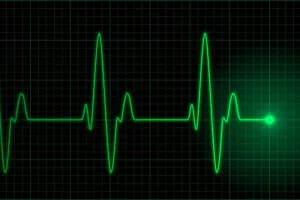Palpitations- what are they and when are they serious?
Palpitations are a common reason for people to attend their doctor. They can be frightening and may cause a lot of anxiety, which can make the symptoms worse. Whilst in most cases palpitations are nothing to worry about, occasionally they may indicate an underlying illness, so they should always be taken seriously and checked out by a doctor.
What are palpitations?
- Simply put, palpitations are an over-awareness of your heartbeat.
- They can feel quite different in different people- for example, they may be experienced as missed beats, fluttering, abnormally strong beats, thudding, racing or pounding.
- It can be helpful to tap the beat out when explaining symptoms to a doctor.
What causes palpitations?
- Most palpitations are harmless, and often no underlying abnormality of the heartbeat or rhythm is found.
- However, in some cases there may be an arrhythmia- this is an abnormality of the heart rhythm, or abnormal electric activity in the heart.
- Anxiety and stress– in about a third of cases, stress or anxiety is the cause of palpitations. Raised adrenaline levels can affect the heart, causing it to beat faster. However, some studies have shown that panic and anxiety may be over-diagnosed in cases where there is also an arrhythmia present. So, it’s important to have the appropriate tests, even if anxiety is present.
- Extrasystoles – often referred to as “ectopic beats”, these are the most frequent type of arrhythmia, and tend to be experienced as a missed or skipped beat, often followed by a stronger beat. They are not usually associated with any heart problems, but if they’re very frequent (30 or more per hour) or occur in individuals over the age of 55, they may be a sign of an underlying heart issue.
- Sinus tachycardia – this is when the heart beats faster (as it would during exercise or stress), but it can also be caused by underlying illness such as fever, anaemia or an overactive thyroid gland
- Atrial fibrillation or atrial flutter – atrial fibrillation is usually a fast, irregular heart beat and may make a person feel quite unwell- weak, faint or short of breath. For some people it comes and goes, in others it is continuous. Atrial flutter is also a fast heart beat, but is not as erratic as atrial fibrillation.
- Paroxysmal supraventricular tachycardia (SVT) – this is caused by conduction abnormalities in the heart muscle. It leads to bouts of very rapid but regular heartbeat.
- Ventricular tachycardia – this is a serious arrhythmia and may relate to exertion. It can lead to sudden collapse and death.
- Drugs and medication– certain medications and inhalers may cause arrhythmias- it’s worth checking the label of anything you’re taking to see if it could be a contributing factor.
- Lifestyle factors– too much caffeine, alcohol, or illicit drugs such as cocaine.
What tests are needed?
- Your GP will usually check your pulse, blood pressure and listen to your heart
- Blood tests may be advised- at minimum this would include a full blood count, renal profile, thyroid function test, and iron studies
- A 12 lead ECG (a tracing of the electrical activity of the heart)
- Sometimes patients are asked to wear a monitor for longer, particularly if the palpitations are coming and going, as it may improve the chances of spotting them. The monitor records the electrical activity of the heart for one or more days. The person presses a button if they feel the palpitations happening – this allows the doctor to see what’s happening in the heart at that point in time
- A referral to a cardiologist for further tests may be recommended
What about smart phone rhythm recorders?
Devices such as AliveCor now allow people to record their heart rhythm via their smartphone. The monitor is attached to the phone, and the user places 2 fingers onto it for 30 seconds to get an ECG recording. These devices are not overly expensive, appear to be quite effective and are being used in hospitals and by GPs in some places.
When are palpitations serious?
There are some “red flag” symptoms- if any of the following issues are associated with palpitations, it could indicate an underlying heart problem, so urgent medical attention should be sought.
- fainting, light-headedness or dizziness
- chest pain
- significant shortness of breath
- palpitations that happen during or just after exertion
- palpitations that start suddenly, are very fast, and then end suddenly- this suggests SVT. People with SVT may notice they can make the palpitations stop by holding their breath.
- a history of heart attack, angina, stroke or heart surgery
- a family history of sudden cardiac death, especially in people under the age of 40
If you have been getting palpitations, you should speak to your doctor, for a physical examination and tests. If you have any of the red flag symptoms mentioned above, you should seek urgent medical attention. Anyone who gets palpitations associated with chest pain, chest tightness, dizziness, fainting, or significant shortness of breath should dial triple zero (000)
Getting a Mental Health Care Plan in Australia: Your Guide
Getting a Mental Health Care Plan in Australia: Your Guide Mental health matters—and if you’re feeling overwhelmed, anxious, or down, a mental health care plan can help. But what is it, and how do [...]
UTI Symptoms and Treatment: What You Need to Know
UTI Symptoms and Treatment: What You Need to Know Urinary Tract Infections (UTIs) are common, uncomfortable, and often disruptive. But what exactly are the signs to watch for, and how can you get relief [...]
Free Mental Health Care Plan Online | Bulk-Billed by Qoctor
Free Mental Health Care Plan Online | Bulk-Billed by Qoctor Discover how to get a free, bulk-billed Mental Health Care Plan (MHCP) in Australia through Qoctor's telehealth service. Accessing [...]






